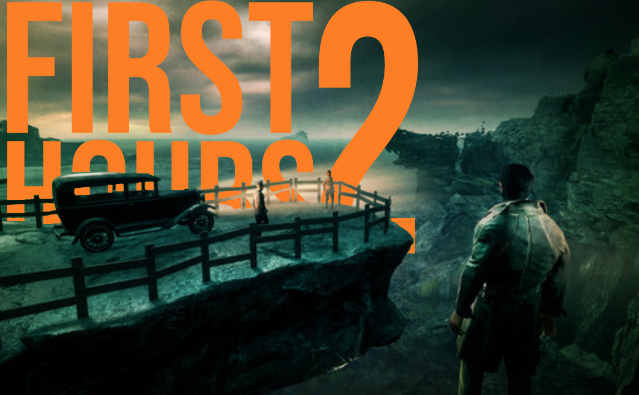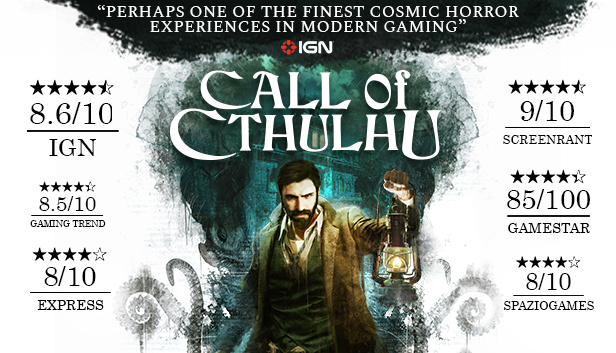Call of Cthulhu: A Deep Dive into Madness - First Two Hours Review
Call of Cthulhu masterfully blends detective work with Lovecraftian horror, creating an atmospheric mystery that keeps you guessing. Despite some repetitive NPC dialogue, its engaging story and well-crafted environment make it a must-play for horror fans. 4/5 Waffles.

TL;DR:
Hey everyone, Josh here with another deep dive into our First Two Hours series. Tonight, we're exploring the psychological horror mystery game Call of Cthulhu, and let me tell you - this one's been living rent-free in my head since we started streaming it. Let's break down everything you need to know about this Lovecraftian adventure that had me jumping out of my chair (more than once, I'll admit).

Initial Impressions:
From the moment you boot up the game, Call of Cthulhu sets its tone perfectly. The opening menu, with its eerie music and dark aesthetics, immediately puts you on edge. The brightness adjustment screen alone tells you what kind of experience you're in for - this isn't going to be your typical walk in the park.
The game drops you into the shoes of Edward Pierce, a private investigator who's clearly seen better days. He's got a drinking problem, a failing career, and a case that's about to turn his world upside down. It's the classic noir detective setup with a supernatural twist that works surprisingly well.
Technical Aspects and Graphics:
Let's talk about the visual presentation first. Call of Cthulhu runs on Unreal Engine 4, and while it might not be pushing any graphical boundaries, the art direction absolutely nails what it's going for. The game offers a decent range of graphics options including:
- View distance settings
- Texture quality adjustments
- Motion blur toggle
- V-sync options
- Frame rate limiting capabilities
The environment design deserves special mention. Darkwater Island, where most of the action takes place, feels appropriately oppressive. The mansion, in particular, is a masterclass in environmental storytelling. Every creaking floorboard and shadow-filled corner adds to the atmosphere.
Gameplay Mechanics and Systems:
The investigation mechanics form the core of the gameplay experience. You'll spend most of your time:
- Searching for clues marked by interactive points
- Using your detective skills to reconstruct crime scenes
- Managing a surprisingly deep skill tree system
- Making dialogue choices that appear to have genuine consequences
- Solving environmental puzzles that require careful observation
The skill system is particularly interesting. You start with character points to distribute across various abilities like:
- Spot Hidden (helps find additional clues)
- Psychology (better understanding of characters)
- Strength (for physical challenges)
- Eloquence (improved dialogue options)
What makes this system engaging is how it affects your investigation options. Having a higher spot hidden skill, for example, reveals additional clues that might otherwise remain hidden. This adds genuine replay value as different skill combinations could lead to different discoveries and outcomes.
Sound Design and Audio:
The audio work in Call of Cthulhu deserves special recognition. Instead of relying on a constant musical score, the game uses:
- Ambient environmental sounds
- Strategic audio cues for tension
- Well-timed thunder and lightning effects
- Creaking floorboards and distant noises
- Voice acting that generally hits the mark
The absence of constant background music actually works in the game's favor, making those moments when the score does kick in all the more impactful. That said, I did notice some inconsistencies in dialogue audio levels, particularly during NPC conversations.
Story and Narrative Design:
The story centers around the mysterious death of the Hawkins family, and it's here where the game really shines. The narrative unfolds through:
- Direct investigation of crime scenes
- Dialogue with various characters
- Document discoveries
- Environmental storytelling
- Reconstruction sequences
The pacing is deliberate, drip-feeding information in a way that keeps you invested without overwhelming you with exposition. The writing strikes a good balance between noir detective fiction and Lovecraftian horror, though some NPC conversations can become repetitive after exhausting all dialogue options.
RPG Elements and Choice:
The game incorporates several RPG mechanics that add depth to the experience:
- Character progression through skill points
- Dialogue choices that affect relationships
- Investigation paths that vary based on abilities
- Sanity system that impacts gameplay
- Multiple possible outcomes based on decisions
Social System and NPC Interactions:
While the NPC interaction system shows promise, it does have some limitations:
- Dialogue options can become repetitive
- Some conversations feel too limited in scope
- NPCs don't always react naturally to different approaches
- The relationship system could be more transparent
However, the core character interactions, particularly during key story moments, are well executed and help drive the narrative forward.
Technical Performance:
Running on modern hardware, the game maintains stable performance with few issues:
- Consistent frame rates at 60 FPS
- Minimal loading times between areas
- No significant bugs or glitches encountered
- Stable performance during investigation sequences
Price Point and Value Proposition:
At the time of this review, Call of Cthulhu is available on Steam for $20 (currently 80% off at $4). Considering the production values, narrative depth, and replay potential, this represents excellent value for money, especially at the sale price.
Final Verdict: 4 out of 5 Waffles
Call of Cthulhu successfully combines detective work with psychological horror to create an engaging experience that horror fans and mystery enthusiasts should definitely check out. While there are some limitations in NPC interactions and occasional audio inconsistencies, the core gameplay loop, atmosphere, and story more than make up for these shortcomings.
The game excels at:
- Creating a genuinely unsettling atmosphere
- Delivering an engaging mystery narrative
- Providing meaningful character progression
- Offering replay value through different skill builds
- Maintaining tension without relying on cheap scares
Areas for improvement:
- NPC interaction depth
- Audio consistency in dialogues
- More varied conversation options
- Clearer consequences for choices
As always, you can catch these First Two Hours reviews every Tuesday at 9:45 PM Eastern on twitch.tv/2tonwaffle, or join our community at 2townwaffle.com. Don't forget to check out our forums for discussion about upcoming games and share your own experiences with Call of Cthulhu.
Later, taters!
FAQ:
Q1: Is this game actually scary?
A: Yes, but it relies more on psychological horror and atmosphere rather than jump scares, though there are a few of those too.
Q2: How long is the game?
A: The main story takes about 12-15 hours to complete, depending on how thoroughly you investigate.
Q3: Do I need to know Lovecraft's work to enjoy it?
A: No, the game works as a standalone story, though fans of Lovecraft will appreciate the references.
Q4: Can you fail investigations?
A: Yes, missing clues or making wrong choices can lead to different outcomes and potentially worse endings.
Q5: Are there combat mechanics?
A: There's minimal combat; the focus is on investigation and dialogue choices.
Q6: Does it have multiple endings?
A: Yes, your choices and how you build your character can lead to different conclusions.
Q7: Are there any game-breaking bugs?
A: No major bugs were encountered during the review, and the game runs stably.
Q8: Do I need a powerful PC to run it?
A: No, the game runs well on moderate hardware and maintains steady 60 FPS on most systems.
Q9: Is there any replay value?
A: Yes, different skill builds and choice outcomes make multiple playthroughs worthwhile.
Q10: Is it worth the full $20 price?
A: While it's definitely worth the $4 sale price, even at $20 it offers good value for horror/mystery fans.





